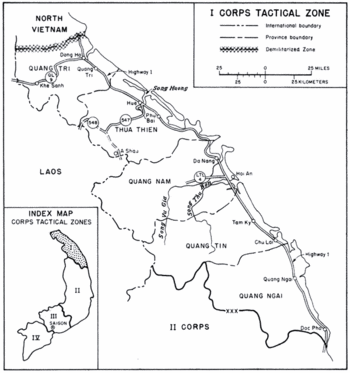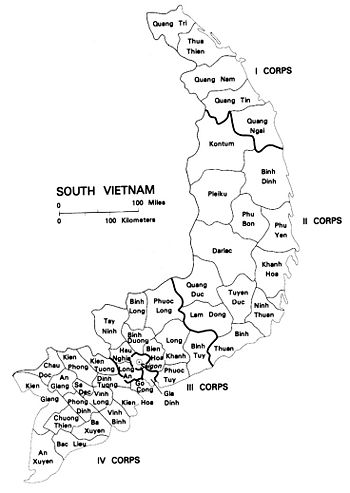I Corps tactical zone: Difference between revisions
imported>Caesar Schinas m (Bot: Update image code) |
Pat Palmer (talk | contribs) (PropDel) |
||
| Line 1: | Line 1: | ||
{{PropDel}}<br><br> | |||
{{subpages}} | {{subpages}} | ||
{{Image|I CTZ.gif|right|350px|I Corps}} | {{Image|I CTZ.gif|right|350px|I Corps}} | ||
Revision as of 14:07, 13 August 2024
| This article may be deleted soon. | ||||||||||||||||||||
|---|---|---|---|---|---|---|---|---|---|---|---|---|---|---|---|---|---|---|---|---|
During the Vietnam War, the Army of the Republic of Viet Nam (ARVN) defined I Corps tactical zone (I CTZ)[1] as the five northernmost provinces of South Vietnam: from approximate north to south, these were Provinces in I CTZ
Its northern border was the Demilitarized Zone (DMZ) with North Vietnam; National Highway 9 ran along it. On the west, it bordered Laos and areas of the Ho Chi Minh trail. The largest cities of the zone were Hue and Danang. Major engagements, at small locations, included the Battle of Khe Sanh and the Battle of Con Thien. North Vietnamese equivalentsThese areas came under Military Regions 4 and 5, as well as the B-5 Front.[2] U.S. equivalentsAmerican forces in I Corps began with III Marine Amphibious Force, its name changed from the usual designation of III Marine Expeditionary Force due to "expeditionary force" having unfortunate connotations, to the Vietnamese, from French usage. Later in the war, the Military Assistance Command, Vietnam, asserted more control over the Marines, variously putting a forward echelon of MACV there, and establishing TASK FORCE OREGON and Provisional Corps, Vietnam. CommandersIn 1972, Hoang Xuan Lam was dismissed for incompetence. References
|
||||||||||||||||||||

